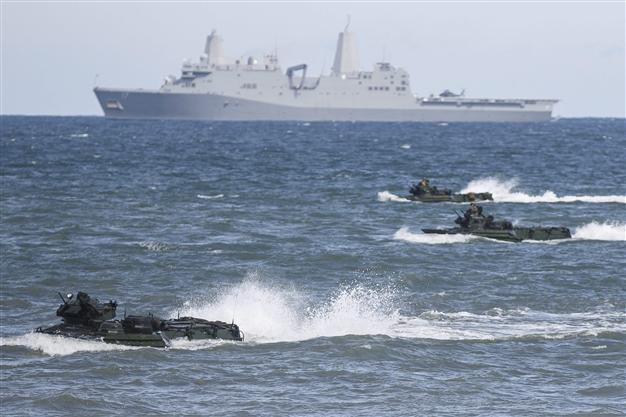NATO says implementing 'biggest' defence boost since Cold War
ZAGAN, Poland - Agence France-Presse

More than five thousand air, sea and ground troops take part in a multinational NATO maritime exercise in the Baltic Sea to demonstrate the resolve of allied and partner forces to defend the Baltic region near Ustka, Poland June 17, 2015. Reuters Photo
NATO head Jens Stoltenberg said June 17 the alliance was implementing its biggest defence reinforcement since the Cold War, as the region grapples with terrorism and an increasingly assertive Russia.He spoke a day after Russian President Vladimir Putin said Moscow would add more than 40 new intercontinental ballistic missiles to its nuclear arsenal this year.
"NATO is facing a new security environment, both caused by violence, turmoil, instability in the south -- ISIL [Islamic State of Iraq and the Levant] in Iraq, Syria, North Africa -- but also caused by the behaviour of a more assertive Russia, which has used force to change borders, to annex Crimea and to destabilise eastern Ukraine," Stoltenberg told reporters.
"And therefore NATO has to respond. We are responding, and we are doing so by implementing the biggest reinforcement of our collective defences since the end of the Cold War and the Spearhead force is a key element of this reinforcement, and it's great to see that it's functional, and that it's exercising here in Poland," he said.
He spoke in Zagan in western Poland while attending the first full exercise of NATO's new rapid reaction force, created to deter Russia from any action against nervous east European allies that were once ruled from Moscow.
Around 2,100 soldiers from Belgium, the Czech Republic, Germany, Hungary, Lithuania, the Netherlands, Norway, Poland and the United States have been taking part in the NATO exercise since last week.
The drill is designed to test NATO's Very High Readiness Joint Task Force (VJTF), established in the wake of the alliance's September 2014 summit in Wales, which focussed on reinforcing the alliance's eastern flank amid jitters over Russia.
Moscow's 2014 annexation of Crimea and its meddling in eastern Ukraine have triggered concern in ex-communist eastern and central European states that joined NATO after the Cold War.
Tension is particularly high in the Baltic states, which emerged from nearly five decades of Soviet occupation in the early 1990s.
















